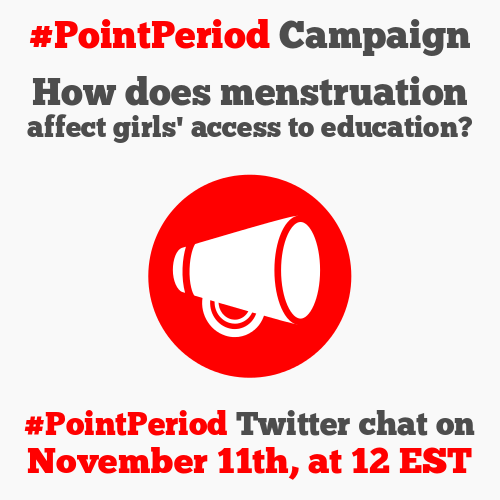Point Period Campaign

In November 2014 we organized #PointPeriod Campaign with Day of the Girl Summit The point is: periods shouldn’t keep girls out of schools. Make a point of educating yourself and others. #PointPeriod.
Did you know that in much of the developing world a healthy body function – menstruation – prevents girls from attending and finishing school? In Garissa, Kenya, 86% of girls report missing school during their periods, and in India 23% drop out after they start menstruating. Girls’ education is everyone’s issue; when girls get educated their future earnings grow, they marry later, they have fewer and healthier children, and they are safer from violence. The goal of the campaign was to learn how menstruation affects girls’ education and what can be done about it.
 We released three infographics for anyone to share (scroll down to download), use them to spread the message, inform your schools and communities. We also had a Twitter chat on November 11th, with a number of other organizations that work on menstrual hygiene, education and girls’ rights. You can check out the chat here.
We released three infographics for anyone to share (scroll down to download), use them to spread the message, inform your schools and communities. We also had a Twitter chat on November 11th, with a number of other organizations that work on menstrual hygiene, education and girls’ rights. You can check out the chat here.
We wrote these pieces about how menstruation affects girls’ education:
- Girls’ Globe: Why does menstruation matter?
- The Guardian Global Development Professionals Network: Not just a girls’ problem: the economic impact of menstrual shame
Our campaign was publicized in this piece from Huffington Post: Menstruation Matters: How Periods Are Keeping Girls Out of School in Nepal.
Infographic – the basics
Infographic – the links between menstruation and education
Infographic – menstruation and sanitation in schools
Here are some sample tweets and posts to share with your network:
Menstruation does not mean shame and stigma, it’s a healthy body function. Periods shouldn’t keep girls out of school. Make a point of educating yourself and others. #PointPeriod
For too many girls periods mean missing school days: 86% of girls in Garissa, Kenya, report missing school during menstruation. In India 23% of girls drop out. Periods shouldn’t keep girls out of school. #PointPeriod
Menstruation matters for girls’ education – many girls miss school or drop out when their period starts. Periods shouldn’t keep girls out of school. It’s time to challenge menstruation shame and stigma. #PointPeriod
Do you believe education is a basic human right? Every child deserves to go to school, but millions of girls in the developing world are deprived of education simply because they menstruate. Periods shouldn’t keep girls out of school. #PointPeriod
4 in 5 girls in Burkina Faso and Niger report being scared of their first period. It affects their school attendance and performance. They shouldn’t be afraid of this healthy body function. We have to educate girls about menstrual hygiene, and end menstruation shame and stigma. #PointPeriod
To continue education after they start menstruating, girls in the developing world need girl friendly toilets in schools: safe, private, hygienic, and separate. They need access to affordable menstrual materials and menstruation hygiene awareness. #PointPeriod
Have you ever wondered how girls in other countries experience menstruation? Meet Sushila from Nepal and learn what it was like for her and other girls in her village. #PointPeriod
23% of girls in India drop out after they start menstruating. Periods shouldn’t keep girls out of school. #PointPeriod #menstruationmatters
55% of schools in least developed countries lack adequate toilets. Would you go to school during your period if there was no toilet? #PointPeriod
What would you do if you had your period and your school didn’t have a toilet? Millions of girls face this challenge every month. #PointPeriod
86% of girls in Garissa, Kenya, report missing school during menstruation. Periods shouldn’t keep girls out of school. #PointPeriod
What do you do if you can’t buy pads or tampons? 88% of women and girls in India have no access to sanitary menstrual materials. #PointPeriod
4 in 5 girls in Burkina Faso and Niger are scared of their first period. Girls have the right to know what happens in their bodies. #PointPeriod
Want to find out more? Check out these resources:
Menstrual Hygiene Day
Menstrual Hygiene: Breaking The Silence
The Menstrual Hygiene Taboo: A Vicious Cycle Of Silence
We Can’t Wait. A report on sanitation and hygiene for women and girls. WaterAid. 2013
Menstrual hygiene matters. WaterAid. 2012
Education Counts: Towards the Millennium Development Goals. UNESCO. 2011.
Returns to Investment in Education: A Further Update, World Bank.





